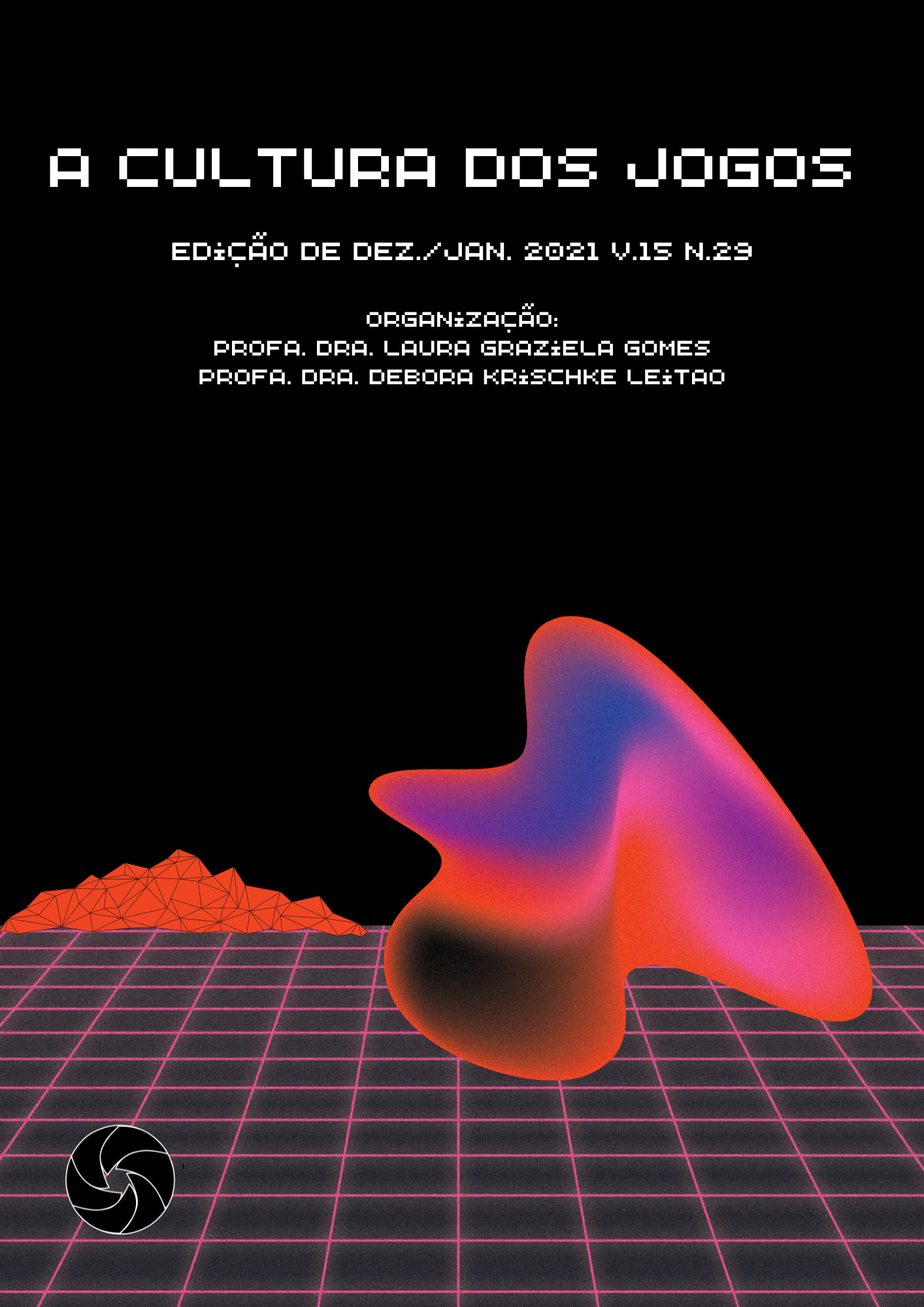What it's Like to be a Nord: sobre os limites da experiência de racialização em Skyrim
DOI:
https://doi.org/10.5433/2237-9126.2022v16n29p122Palavras-chave:
Skyrim, Cultura dos Jogos, Raça, VideogamesResumo
O argumento desenvolvido neste artigo é que o tratamento das relações raciais em Skyrim cria uma experiência de jogo paradoxal onde a raça é um elemento determinante no destino dos NPCs e no curso dos eventos retratados no jogo, mas continua a ser um aspecto negligenciável, mesmo cosmético, da experiência do personagem criado pelo jogador. Afirmamos que, apesar de uma forte racialização do lore de Skyrim, o personagem principal não experimenta a sua mecânica. A partir daqui, argumentaremos que a aparente 'neutralidade' racial da experiência do jogador é de fato a experiência de uma posição social dominante. Isso tem um efeito sobre a própria coerência da metanarrativa implantada através do jogo.Downloads
Não há dados estatísticos.
Referências
AARSETH, Espen. Cybertext: Perspectives on ergodic literature. Baltimore and London: Johns Hopkins University Press. 1997.
ARSENAULT, Dominic; PICARD, Martin. Le jeu vidéo entre dépendance et plaisir immersif : les trois formes d'immersion vidéoludique, Actes du colloque Homo Ludens. Le jeu vidéo : un phénomène social massivement pratiqué, Congrès de l'ACFAS, 2008.
CALLEJA, Gordon. In-Game: From Immersion to Incorporation. Cambridge: MIT Press, 2011.
BARTH, Fredrik. Ethnic Groups and Boundaries. The Social Organization of Cultural Difference, Boston: Little, Brown and Company, 1969.
BEAUDE, Boris. Les jeux vidéo comme espaces de médiation ludique, Espace et temps du jeu vidéo, dir. Samuel Rufat et Hovig Ter Minassian, 2014, p. 28-52.
BOGOST, Ian. Videogames and Ideological Frames, Popular communication, v.4, n.3, 2006, p. 165-183.
BOGOST, Ian. Persuasive Games: The expressive power of videogames. Massachusetts: The MIT Press, 2007.
BONILLA-SILVA, Eduardo. Racism without racists: color-blind racism and the persistence of racial inequality. Maryland: America Lanham: Rowman & Littlefield publishers, 2017.
BRUBAKER, Rogers; COOPER, Frederick. Beyond Identity. Theory and Society, v. 29, n. 1, 2000, p. 1-47.
BRUBAKER, Rogers. Ethnicity Without Groups. Cambridge: Harvard University Press, 2004.
CERVULLE, Maxime. Dans le blanc des yeux: diversité, racisme et médias. Amsterdam: Paris: éditions, 2013.
DOVEY, Jon. KENNEDY, Helen. Game Cultures. New York: McGraw-Hill Education, 2006.
DU BOIS, William Edward Burghardt. Soul of the Black Folk (1903), in SUNDQUIST, Eric. The Oxford W.E.B. Du Bois. Reader. Oxford: Oxford University Press, 1996, p. 97-240.
DUFOUR, Frédérick-Guillaume. La sociologie du nationalisme: relations, cognition, comparaisons et processus. Québec: Presses de l'Université du Québec, 2019.
GRAFT, Kris. Interview: Todd Howard On The Scope, Vision Of Skyrim. Game Developer. 7 de julho de 2011. https://www.gamedeveloper.com/business/interview-todd-howard-on-the-scope-vision-of-i-skyrim-i-. Acesso em 08 de outubro de 2021.
JENKINS, Richard. Rethinking Ethnicity. Arguments and Explorations. Thousand Oaks: Sage Publications, 2008.
TONNELAT, Ernest. "Mythologie germanique". In: GUIRAUD, Félix et SCHMIDT Joël (org.). Mythes et mythologies. Paris: Larousse, 2019, p. 291-338.
LEROUX, Yann. Métapsychologie de l'immersion dans les jeux vidéo. Adolescence, v.79, n.1, 2012, p. 107-118.
MCKERNAN, Brian. The meaning of a game: Stereotypes, video game commentary and color-blind racism. American Journal of Cultural Sociology, v.3, n.2, 2015, p. 224-253.
MILLER-IDRISS, Cynthia. Hate in the Homeland. The New Global Far Right. Princeton: Princeton University Press, 2020.
MURRAY, Janet. Hamlet on the Holodeck: The Future of Narrative. Cyberspace. Cambridge: MIT Press, 1998.
MURRAY, Soraya. High Art/Low Life: The Art of Playing Grand Theft Auto. PAJ: A Journal of Performance and Art, v. 27, n. 2, 2005. p. 91-98.
RATHJE, Steve; HACKEL, Leor & ZAKI, Jamil. Attending live theatre improves empathy, changes attitudes, and leads to pro-social behavior. Journal of Experimental Social Psychology, v. 95, s.n, 2021, s.p.
RYAN, Marie-Laure. Des jeux narratifs aux fictions ludiques: Vers une poétique de la narration interactive, Nouvelle Revue d'Esthétique, v. 1, s.n., 2013, p. 37-50.
SALTER, Mark B. The Geographical Imaginations of Video Games: Diplomacy, Civilization, America's Army and Grand Theft Auto IV. Geopolitics, v. 16, n. 2, 2011, p. 359-388.
SCHUETZ, Alfred. The Stranger: an Essay in Social Psychology. American Journal of Sociology, v. 46, n. 6. 1944. p. 499-507.
SIMMEL, Georg. Soziologie: Untersuchungen über die Formen der Vergesellschaftung. Leipzig: Duncker & Humblot, 1908.
SMITH, Anthony D. Nationalism. Cambridge: Polity Press, 2001.
SRAUY, Sam & CHENEY-LIPPOLD, John. Realism in FIFA? How social realism enabled platformed racism in a video game. First Monday, v. 24, n. 6, 2019, s.p.
TILLY, Charles. Durable Inequality. Berkeley: University of California Press, 1999.
TILLY, Charles. Social Boundary Mechanisms. Philosophy of the Social Sciences, v. 34, n. 2, 2004, p. 211-236.
WALKER, Richard. The Elder Scrolls: Skyrim. Q&A With Lead Designer. Acesso em 3 de junho de 2011.
NESMITH, Bruce. Playstation Trophies. Disponível em: https://www.playstationtrophies.org/news/news-3764-The-Elder-Scrolls--Skyrim-Q-A-With-Lead-Designer--Bruce-Nesmith.html. Acesso em 08 de outubro de 2021.
WEBER, Max. Économie et société. Tome 1. Paris: Plon, 1995.
WIMMER, Andreas. Ethnic Boundary Making. Oxford: Oxford University Press, 2012.
YOUNG, Helen. Race and Popular Fantasy Literature: Habits of Whiteness. Londres: Routledge, 2015.
ARSENAULT, Dominic; PICARD, Martin. Le jeu vidéo entre dépendance et plaisir immersif : les trois formes d'immersion vidéoludique, Actes du colloque Homo Ludens. Le jeu vidéo : un phénomène social massivement pratiqué, Congrès de l'ACFAS, 2008.
CALLEJA, Gordon. In-Game: From Immersion to Incorporation. Cambridge: MIT Press, 2011.
BARTH, Fredrik. Ethnic Groups and Boundaries. The Social Organization of Cultural Difference, Boston: Little, Brown and Company, 1969.
BEAUDE, Boris. Les jeux vidéo comme espaces de médiation ludique, Espace et temps du jeu vidéo, dir. Samuel Rufat et Hovig Ter Minassian, 2014, p. 28-52.
BOGOST, Ian. Videogames and Ideological Frames, Popular communication, v.4, n.3, 2006, p. 165-183.
BOGOST, Ian. Persuasive Games: The expressive power of videogames. Massachusetts: The MIT Press, 2007.
BONILLA-SILVA, Eduardo. Racism without racists: color-blind racism and the persistence of racial inequality. Maryland: America Lanham: Rowman & Littlefield publishers, 2017.
BRUBAKER, Rogers; COOPER, Frederick. Beyond Identity. Theory and Society, v. 29, n. 1, 2000, p. 1-47.
BRUBAKER, Rogers. Ethnicity Without Groups. Cambridge: Harvard University Press, 2004.
CERVULLE, Maxime. Dans le blanc des yeux: diversité, racisme et médias. Amsterdam: Paris: éditions, 2013.
DOVEY, Jon. KENNEDY, Helen. Game Cultures. New York: McGraw-Hill Education, 2006.
DU BOIS, William Edward Burghardt. Soul of the Black Folk (1903), in SUNDQUIST, Eric. The Oxford W.E.B. Du Bois. Reader. Oxford: Oxford University Press, 1996, p. 97-240.
DUFOUR, Frédérick-Guillaume. La sociologie du nationalisme: relations, cognition, comparaisons et processus. Québec: Presses de l'Université du Québec, 2019.
GRAFT, Kris. Interview: Todd Howard On The Scope, Vision Of Skyrim. Game Developer. 7 de julho de 2011. https://www.gamedeveloper.com/business/interview-todd-howard-on-the-scope-vision-of-i-skyrim-i-. Acesso em 08 de outubro de 2021.
JENKINS, Richard. Rethinking Ethnicity. Arguments and Explorations. Thousand Oaks: Sage Publications, 2008.
TONNELAT, Ernest. "Mythologie germanique". In: GUIRAUD, Félix et SCHMIDT Joël (org.). Mythes et mythologies. Paris: Larousse, 2019, p. 291-338.
LEROUX, Yann. Métapsychologie de l'immersion dans les jeux vidéo. Adolescence, v.79, n.1, 2012, p. 107-118.
MCKERNAN, Brian. The meaning of a game: Stereotypes, video game commentary and color-blind racism. American Journal of Cultural Sociology, v.3, n.2, 2015, p. 224-253.
MILLER-IDRISS, Cynthia. Hate in the Homeland. The New Global Far Right. Princeton: Princeton University Press, 2020.
MURRAY, Janet. Hamlet on the Holodeck: The Future of Narrative. Cyberspace. Cambridge: MIT Press, 1998.
MURRAY, Soraya. High Art/Low Life: The Art of Playing Grand Theft Auto. PAJ: A Journal of Performance and Art, v. 27, n. 2, 2005. p. 91-98.
RATHJE, Steve; HACKEL, Leor & ZAKI, Jamil. Attending live theatre improves empathy, changes attitudes, and leads to pro-social behavior. Journal of Experimental Social Psychology, v. 95, s.n, 2021, s.p.
RYAN, Marie-Laure. Des jeux narratifs aux fictions ludiques: Vers une poétique de la narration interactive, Nouvelle Revue d'Esthétique, v. 1, s.n., 2013, p. 37-50.
SALTER, Mark B. The Geographical Imaginations of Video Games: Diplomacy, Civilization, America's Army and Grand Theft Auto IV. Geopolitics, v. 16, n. 2, 2011, p. 359-388.
SCHUETZ, Alfred. The Stranger: an Essay in Social Psychology. American Journal of Sociology, v. 46, n. 6. 1944. p. 499-507.
SIMMEL, Georg. Soziologie: Untersuchungen über die Formen der Vergesellschaftung. Leipzig: Duncker & Humblot, 1908.
SMITH, Anthony D. Nationalism. Cambridge: Polity Press, 2001.
SRAUY, Sam & CHENEY-LIPPOLD, John. Realism in FIFA? How social realism enabled platformed racism in a video game. First Monday, v. 24, n. 6, 2019, s.p.
TILLY, Charles. Durable Inequality. Berkeley: University of California Press, 1999.
TILLY, Charles. Social Boundary Mechanisms. Philosophy of the Social Sciences, v. 34, n. 2, 2004, p. 211-236.
WALKER, Richard. The Elder Scrolls: Skyrim. Q&A With Lead Designer. Acesso em 3 de junho de 2011.
NESMITH, Bruce. Playstation Trophies. Disponível em: https://www.playstationtrophies.org/news/news-3764-The-Elder-Scrolls--Skyrim-Q-A-With-Lead-Designer--Bruce-Nesmith.html. Acesso em 08 de outubro de 2021.
WEBER, Max. Économie et société. Tome 1. Paris: Plon, 1995.
WIMMER, Andreas. Ethnic Boundary Making. Oxford: Oxford University Press, 2012.
YOUNG, Helen. Race and Popular Fantasy Literature: Habits of Whiteness. Londres: Routledge, 2015.












 As obras deste periódico estão licenciadas com
As obras deste periódico estão licenciadas com 